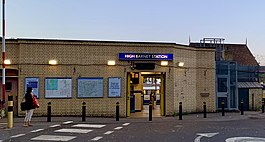| High Barnet | |
|---|---|
 Southern entrance Southern entrance | |
 | |
| Location | Chipping Barnet |
| Local authority | London Borough of Barnet |
| Managed by | London Underground |
| Number of platforms | 3 |
| Accessible | Yes |
| Fare zone | 5 |
| London Underground annual entry and exit | |
| 2019 | |
| 2020 | |
| 2021 | |
| 2022 | |
| 2023 | |
| Key dates | |
| 1 April 1872 | Opened (GNR) |
| 14 April 1940 | Started (Northern line) |
| 1941 | Ended (LNER) |
| 1 October 1962 | Goods yard closed |
| Other information | |
| External links | |
| Coordinates | 51°39′02″N 0°11′39″W / 51.6505°N 0.1941°W / 51.6505; -0.1941 |
High Barnet is a London Underground station, and former railway station, located in Chipping Barnet, North London. The station is the northern terminus of the High Barnet branch of the Northern line and is in Travelcard Zone 5. It is situated 10.2 miles (16.4 km) north north-west of Charing Cross. The next station south is Totteridge & Whetstone.
Services
Northern line trains are scheduled to arrive and depart every 3–9 minutes from the station's three southbound platforms, with trains operating to Morden via Bank or to Kennington, Battersea Power Station or Morden via Charing Cross.
On days when Night Tube service is not running, between about 00:00 and 01:00, departing trains run as far as East Finchley only, from where journeys to central London can be continued by night bus N20, which also serves High Barnet station itself.
When trains are no longer required to run on the Northern line, they may be stabled on the sidings to the east of the station.
Connections
London Buses routes 34, 107, 184, 234, 263, 307, 326, 383, 384, 389, school routes 606, 626, 634 and night route N20 serve the station.
History
High Barnet station was planned by the Edgware, Highgate and London Railway (EH&LR) and was originally opened on 1 April 1872 by the Great Northern Railway (which had taken over the EH&LR) on the original site of the Barnet Faire. It was the terminus of the branch of a line that ran from Finsbury Park to Edgware via Highgate.
After the 1921 Railways Act created the "Big Four" railway companies the line was, from 1923, part of the London & North Eastern Railway (LNER). The section of the High Barnet branch north of East Finchley was incorporated into the London Underground network through the "Northern Heights" project begun in the late 1930s. High Barnet station was first served by Northern line trains on 14 April 1940 and, after a period where the station was served by both operators, LNER services ended in 1941. British Railways (the successor to the LNER) freight trains continued to serve the station's goods yard until 1 October 1962, when it was closed.
The station still retains much of its original Victorian architectural character today, with numerous platform buildings dating from the pre-London Transport era.
In 2008, a new train crew accommodation block was constructed immediately to the south west of the station on part of the car park. This was opened on 31 January 2010.
Also, further improvements have been introduced: A new covered step-free entrance from the car park to platform one is now available, along with a ramp at the end of the platform connecting it to platforms two and three. There are also two accessible toilets now available. These works were fully completed in October 2009. Therefore, there is full step-free access coverage in the station, although a considerably steep path to the station still exists if approaching from the north and a steep approach from the road to station level from the south also remains.
Gallery
-
 Northern entrance to High Barnet Station
Northern entrance to High Barnet Station
-
 A walkway around the end of the platform 1 track provides step-free access to platforms 2 and 3
A walkway around the end of the platform 1 track provides step-free access to platforms 2 and 3
-
 Platforms 1 and 2 seen from the footbridge
Platforms 1 and 2 seen from the footbridge
-
 Platform 2
Platform 2
See also
References
- "Step free Tube Guide" (PDF). Transport for London. April 2021. Archived (PDF) from the original on 15 May 2021.
- "Station Usage Data" (XLSX). Usage Statistics for London Stations, 2019. Transport for London. 23 September 2020. Archived from the original on 9 November 2020. Retrieved 9 November 2020.
- "Station Usage Data" (XLSX). Usage Statistics for London Stations, 2020. Transport for London. 16 April 2021. Retrieved 1 January 2022.
- "Station Usage Data" (XLSX). Usage Statistics for London Stations, 2021. Transport for London. 12 July 2022. Retrieved 7 September 2022.
- "Station Usage Data" (XLSX). Usage Statistics for London Stations, 2022. Transport for London. 4 October 2023. Retrieved 10 October 2023.
- "Station Usage Data" (XLSX). Usage Statistics for London Stations, 2023. Transport for London. 8 August 2024. Retrieved 16 September 2024.
- ^ "Underground: The Journal of the London Underground Railway Society" (PDF) (12). December 1962: 7. Archived from the original (PDF) on 1 December 2017. Retrieved 28 November 2017.
{{cite journal}}: Cite journal requires|journal=(help) - "Buses from Barnet High Street" (PDF). TfL. 5 March 2022. Archived from the original (PDF) on 20 November 2022. Retrieved 20 May 2022.
- ^ Clive's Underground Line Guides – Northern Line, Dates
- Rose, Douglas (1999). The London Underground, A Diagrammatic History. Douglas Rose/Capital Transport. ISBN 1-85414-219-4.
External links
| Preceding station | Following station | |||
|---|---|---|---|---|
| Terminus | Northern lineHigh Barnet branch | Totteridge & Whetstonetowards Battersea Power Station, Morden or Kennington | ||
| Northern line | |||||||||||||
|---|---|---|---|---|---|---|---|---|---|---|---|---|---|
| Stations |
| ||||||||||||
| Rolling stock |
| ||||||||||||
| History |
| ||||||||||||
| Depots | |||||||||||||